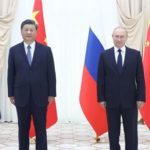
(MOSCOW) — Chinese President Xi Jinping’s visit to Moscow on Monday to meet with Russian President Vladimir Putin will be a significant moment, punching a hole in the international isolation that’s surrounded Putin since the start of his invasion of Ukraine and signaling China now sees far less need to publicly distance itself from Putin amid the war.
The two-day state visit will be Xi’s first trip to Russia since the war began and comes as Western countries are increasingly concerned China is moving to more actively support Moscow and play a more assertive role in shaping the conflict, at a moment when Ukraine is readying for a much-anticipated spring counteroffensive.
“This state visit in the middle of the war shows that Xi Jinping sees the relationship with Russia as absolutely quintessential, he will not be deterred or embarrassed by the fact that Russia conducts a genocidal war against Ukraine,” Alexander Gabuev, an expert on Russia-China relations at the Carnegie Endowment for International Peace, told ABC News. “It’s a significant visit.”
Three weeks before the invasion Putin travelled to Beijing where he and Xi declared a “partnership with no limits.” But during the war, China in practice has observed substantial limits on the level of its support for Russia. It has pursued a difficult line: trying to present itself as neutral, while largely backing Putin’s narrative of the war, and quietly helping Russia weather sanctions and prop up its military with technology and parts.
But China has never abandoned its partnership with Russia, Gabuev said, and the visit in “a way is a step up” in its support.
“Throughout last year China has demonstrated that ties with Russia are absolutely normal and unabated despite Russia’s aggression against Ukraine,” said Gabuev. He noted joint military exercises, as well as visits by senior Chinese and Russian officials, had taken place as scheduled.
A senior Kremlin aide on Friday said Xi and Putin would sign two joint declarations announcing “the deepening of relations of an all-round partnership and strategic cooperation, entering into a new era.”
China’s commitment to Russia will face fresh pressure following the International Criminal Court’s announcement Friday of an arrest warrant for Putin on war crimes charges. The announcement casts an uncomfortable shadow over Xi’s trip: China is not party to the ICC and does not recognize the warrant, but an enthusiastic public embrace of Putin will again undermine Beijing’s efforts to present itself as neutral, just as it is pushing to be seen as a potential peacemaker.
The United States last month began warning it believes China is considering providing Russia with lethal aid for the war for the first time. The U.S. and its allies have already accused China of helping Russia source components under Western sanctions, such as computer chips, needed to keep its war machine going. China has denied it is considering sending lethal aid.
China in recent weeks has mounted a diplomatic offensive seeking to present itself as a potential peacemaker. Last month, China published a so-called “peace proposal” and after meeting Putin, Xi is reportedly expected to speak with Ukraine’s President Volodymyr Zelenskyy for the first time by video call.
But the Chinese proposal in reality was not a plan but largely a vague restatement of principles that support Moscow’s framing of the conflict, experts said. Its key point was an immediate ceasefire that experts say would currently favor the Kremlin by locking in its territorial gains seized from Ukraine.
“China’s vague plan is aimed not at actually ending the war, but at impressing the developing world and rebutting accusations that Beijing has become a silent accomplice to Moscow,” Gabuev wrote in an article for Carnegie.
Gabuev said the peace proposal in reality was meant to provide “diplomatic cover” for Xi’s Moscow trip and support for Russia. The proposal, he said, also was intended to allow China to present itself to countries in the Global South as seeking peace, while in fact continuing to back Putin.
It’s “really just a fig leaf,” he said.
Ukrainian officials have said they believe the Chinese proposal follows Kremlin efforts to freeze the conflict as it stands that would leave it control of occupied areas without making concessions.
“I believe that all peace plans that provide for an immediate ceasefire and preservation of the current territorial status quo are exclusively a game in favor of the Russian Federation,” Mykhailo Podolyak, a top advisor to Zelenskyy told a Ukrainian media outlet in February.
“The 12-point ‘plan’ does not present any actual solutions. In fact, it merely reiterates Beijing’s standard talking points on the war in Ukraine – which are closely linked to its Russia-friendly perspective and its own strategic interests,” Alicja Bachulsk, a policy fellow at the European Council on Foreign Relations wrote last month.
“Beijing is not a neutral actor,” she wrote. Western countries have warned China it will face heavy sanctions if it moves to providing Russia with lethal aid. But experts said the economic support China is already providing is important in allowing the Kremlin to continue the war.
“For Beijing, the worst-case scenario for the end of the war in Ukraine is Russia’s complete failure and subsequent regime change. The Chinese leadership will go to great lengths to prevent this from happening.”
Copyright © 2023, ABC Audio. All rights reserved.
